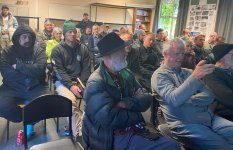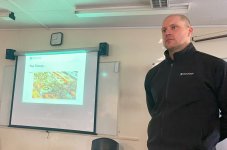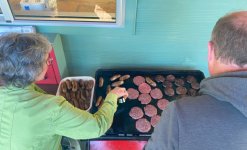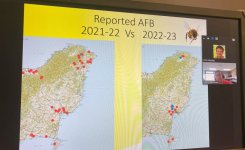I’ve just been to the APINZ Hub Field Day in Gisborne, organised by Steve Jackson, John Mackay and Barry Foster. It was held at the EIT Rural Studies Unit, with nice facilities - and especially since they had student hives available for our inspection and use. A very nice facility, and nicely welcoming to us.
I used to keep good notes; now I keep none at all. So all I’ll be able to do is identify the main speakers and topics…
Martin Laas, from Midlands Apiaries in Canterbury. He described a planned approach to varroa control, both the steps that are taken and why, but also some mention of things that are not yet ready to be used effectively, but may well into the future. After describing the current testing approach (4 samples from each apiary, etc) he described the use of CO2 - using a SodaStream machine, in fact. The CO2 quickly knocks the bees out, and allows for on the spot confirmation of mite numbers, rather than having to take it all back home and potentially involve another trip. Martin described a very methodical approach to the decision making involved, with the overall plan for the timing of treatments and triggers to take more action.
Martin also talked some about the CleanHive Project from Otago, and the value of a managed discussion group.
We then went out to the half dozen or so hives at the edge of thei EIT orchard/gardeing area. Martin demonstrated an alcohol wash, and Barry Foster demonstrated his sticky board for mite monitoring.
There was a well received barbeque lunch, with the typical amount of eating and talking.
After lunch, Dennis Crowley talked about pollination services generally, describing his experiences in the Bay of Plenty. Standards for good pollinatiojn hives, the advantages and disadvantages of doing pollination, and a lot of talk about the particulars of such things as fully and partially screened orchard blocks. Timings of introduction of hives, placement, feeding in the orchard were all talked about.
Yanika Reiter from MPI talked about the monitoring for the Small Hive Beetle that has taken place. She also talked about pest/disease incursions generally, and there was a lot of audience interest. She also described other MPI initiatives
John Mackay led the group in coming up with some ideas for how future engagement in the greater Gisborne and East Cape might be encouraged. The day was certainly well received, by the 50 or so hobbyists and commercial beekeepers to attended. John was keen to ensure that if people wanted to hear of these type of events, they should be sure that they leave an email address.
Marco Gonzalez from the Management Agency spoke to the group by Zoom, and provided some timely stats and locations from the last couple of seasons of AFB identification from the top of the East Cape down as far as about Wairoa. Maps showed where several outbreaks had occurred, and Marco described the response and beekeeper activity that appear to have several now back to controlled. Identifying the source of an AFB outbreak is not always easy, or possible, but after several seasons of applying one’s DECA provisions, AFB will be eliminated.
And then there was beer, and lots more talk…
There are several who read these postings who were also there, but like I say, I don’t keep notes any more, just sat there enjoying myself!
I guess the thing that I appreciated most from this Gisborne APINZ Hub Field Day was the optimism, with several beekeepers talking to me about their long term confidence, even in the face of the terrible times they have had with cyclones…
I used to keep good notes; now I keep none at all. So all I’ll be able to do is identify the main speakers and topics…
Martin Laas, from Midlands Apiaries in Canterbury. He described a planned approach to varroa control, both the steps that are taken and why, but also some mention of things that are not yet ready to be used effectively, but may well into the future. After describing the current testing approach (4 samples from each apiary, etc) he described the use of CO2 - using a SodaStream machine, in fact. The CO2 quickly knocks the bees out, and allows for on the spot confirmation of mite numbers, rather than having to take it all back home and potentially involve another trip. Martin described a very methodical approach to the decision making involved, with the overall plan for the timing of treatments and triggers to take more action.
Martin also talked some about the CleanHive Project from Otago, and the value of a managed discussion group.
We then went out to the half dozen or so hives at the edge of thei EIT orchard/gardeing area. Martin demonstrated an alcohol wash, and Barry Foster demonstrated his sticky board for mite monitoring.
There was a well received barbeque lunch, with the typical amount of eating and talking.
After lunch, Dennis Crowley talked about pollination services generally, describing his experiences in the Bay of Plenty. Standards for good pollinatiojn hives, the advantages and disadvantages of doing pollination, and a lot of talk about the particulars of such things as fully and partially screened orchard blocks. Timings of introduction of hives, placement, feeding in the orchard were all talked about.
Yanika Reiter from MPI talked about the monitoring for the Small Hive Beetle that has taken place. She also talked about pest/disease incursions generally, and there was a lot of audience interest. She also described other MPI initiatives
John Mackay led the group in coming up with some ideas for how future engagement in the greater Gisborne and East Cape might be encouraged. The day was certainly well received, by the 50 or so hobbyists and commercial beekeepers to attended. John was keen to ensure that if people wanted to hear of these type of events, they should be sure that they leave an email address.
Marco Gonzalez from the Management Agency spoke to the group by Zoom, and provided some timely stats and locations from the last couple of seasons of AFB identification from the top of the East Cape down as far as about Wairoa. Maps showed where several outbreaks had occurred, and Marco described the response and beekeeper activity that appear to have several now back to controlled. Identifying the source of an AFB outbreak is not always easy, or possible, but after several seasons of applying one’s DECA provisions, AFB will be eliminated.
And then there was beer, and lots more talk…
There are several who read these postings who were also there, but like I say, I don’t keep notes any more, just sat there enjoying myself!
I guess the thing that I appreciated most from this Gisborne APINZ Hub Field Day was the optimism, with several beekeepers talking to me about their long term confidence, even in the face of the terrible times they have had with cyclones…






